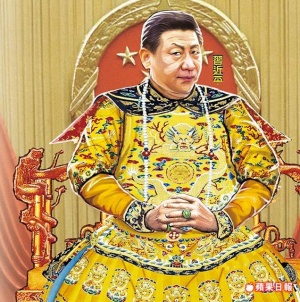“Reigning emperor”的版本间的差异
来自China Digital Space
| (未显示3个用户的10个中间版本) | |||
| 第1行: | 第1行: | ||
| − | <h3>''dāngjīn huángshang'' 当今皇上</h3> | + | <h3>''dāngjīn huángshang'' [[当今皇上]]</h3> |
| − | [[File:当今皇上.jpg|300px|thumb|right|''The reigning emperor. (Source: Apple Daily)'']]Allusion to the | + | [[File:当今皇上.jpg|300px|thumb|right|''The reigning emperor. (Source: Apple Daily)'']]Allusion to the top leader of China in general, and at present to Xi Jinping. Implies that the head of state was anointed, not elected, to a position far more powerful than a modern head of state. |
| − | |||
| − | |||
| − | |||
| − | |||
| + | China's imperial history is a common reference point for netizens, who have coined terms such as [[Celestial empire]], [[Great Qing]], and [[imperial capital]], for example. By implying continuity with the imperial past, these netizen-generated terms subvert Communist claims to have founded a liberated "New China," carrying connotations of dynastic succession and court intrigue rather than genuine representation of "[https://en.wikipedia.org/wiki/Three_Represents the fundamental interests of the overwhelming majority of the Chinese people]." | ||
'''Example of "reigning emperor":''' | '''Example of "reigning emperor":''' | ||
| 第13行: | 第10行: | ||
<blockquote>【疯狂的“包子”】自从习大大到月坛北街庆丰包子铺就餐后,这家京城老字号在全国一夜成名,庆丰猪肉包子和炒肝供不应求,身价百倍,昔日大众化的包子变成'''当今皇上'''贡品。 ['''[https://freeweibo.com/weibo/3670318230660916 Chinese]''']</blockquote> | <blockquote>【疯狂的“包子”】自从习大大到月坛北街庆丰包子铺就餐后,这家京城老字号在全国一夜成名,庆丰猪肉包子和炒肝供不应求,身价百倍,昔日大众化的包子变成'''当今皇上'''贡品。 ['''[https://freeweibo.com/weibo/3670318230660916 Chinese]''']</blockquote> | ||
| + | |||
| + | Throughout most of Xi Jinping's first term as Chinese president and CCP general secretary (2012-2017), commentators consistently wrote about the [http://chinadigitaltimes.net/2016/07/ahead-19th-party-congress-xis-struggle-continues/ massive amount of personal power that the top leader appeared to have gained], commonly [http://chinadigitaltimes.net/2014/07/cult-xi/ comparing Xi to former strongman] leader [http://chinadigitaltimes.net/2013/08/xi-embraces-mao-as-he-tightens-grip-on-country/ Mao Zedong], and [https://www.japantimes.co.jp/opinion/2016/10/11/commentary/world-commentary/chinas-xi-jinping-courts-emperors-syndrome/#.Wep2PUyZPGI highlighting the imperial cache of control] that he appeared to have gained over the state and Party. As the 19th Party Congress—the event that marks the transition from Xi' first term as CCP general secretary to his second—was beginning on October 18, 2017, The New Yorker's [https://www.newyorker.com/news/daily-comment/at-the-communist-party-congress-xi-jinping-plays-the-emperor Jiayang Fan compared Xi's wealth of power to the "absolutism of emperors" of the dynastic era]. | ||
| + | |||
| + | At the beginning of the 19th Party Congress, it became clear that [http://chinadigitaltimes.net/2017/10/party-looks-set-to-enshrine-xi-jinping-thought-into-charter/ Xi's name would likely be immortalized by being amended into the CCP constitution alongside Mao's] and fellow formidable former top leader Deng Xiaoping's. This development lent credence to ongoing comparisons of Xi with his exceptionally power-laden predecessors. | ||
| + | |||
| + | CDT first detected that "reigning emperor" was [http://chinadigitaltimes.net/2014/08/sensitive-words-alibabas-shareholders/ blocked from Weibo search results on August 21, 2014]. It [http://s.weibo.com/weibo/%25E5%25BD%2593%25E4%25BB%258A%25E7%259A%2587%25E4%25B8%258A?topnav=1&wvr=6&b=1 remains blocked as of October 20, 2017]. | ||
| − | See also [[heir apparent]]. | + | See also [[heir apparent]] and [[Celestial Empire]]. |
| − | [[ | + | [[分类:Lexicon]][[分类:Party and State]] |
2024年7月12日 (五) 23:43的最新版本
dāngjīn huángshang 当今皇上
Allusion to the top leader of China in general, and at present to Xi Jinping. Implies that the head of state was anointed, not elected, to a position far more powerful than a modern head of state.
China's imperial history is a common reference point for netizens, who have coined terms such as Celestial empire, Great Qing, and imperial capital, for example. By implying continuity with the imperial past, these netizen-generated terms subvert Communist claims to have founded a liberated "New China," carrying connotations of dynastic succession and court intrigue rather than genuine representation of "the fundamental interests of the overwhelming majority of the Chinese people."
Example of "reigning emperor":
Yushenghai (@余胜海): Crazy "Steamed Buns": Ever since Daddy Xi ate at Qingfeng Steamed Buns on Yuetan North Road, this classic capital restaurant has become a national sensation. Demand has outstripped supply for pork buns and stir-fried liver. Yesterday's everyday buns have become today's tribute to the reigning emperor. (January 24, 2014)
【疯狂的“包子”】自从习大大到月坛北街庆丰包子铺就餐后,这家京城老字号在全国一夜成名,庆丰猪肉包子和炒肝供不应求,身价百倍,昔日大众化的包子变成当今皇上贡品。 [Chinese]
Throughout most of Xi Jinping's first term as Chinese president and CCP general secretary (2012-2017), commentators consistently wrote about the massive amount of personal power that the top leader appeared to have gained, commonly comparing Xi to former strongman leader Mao Zedong, and highlighting the imperial cache of control that he appeared to have gained over the state and Party. As the 19th Party Congress—the event that marks the transition from Xi' first term as CCP general secretary to his second—was beginning on October 18, 2017, The New Yorker's Jiayang Fan compared Xi's wealth of power to the "absolutism of emperors" of the dynastic era.
At the beginning of the 19th Party Congress, it became clear that Xi's name would likely be immortalized by being amended into the CCP constitution alongside Mao's and fellow formidable former top leader Deng Xiaoping's. This development lent credence to ongoing comparisons of Xi with his exceptionally power-laden predecessors.
CDT first detected that "reigning emperor" was blocked from Weibo search results on August 21, 2014. It remains blocked as of October 20, 2017.
See also heir apparent and Celestial Empire.





